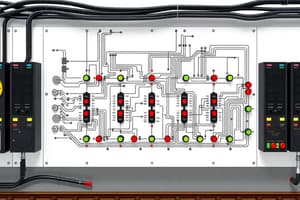Podcast
Questions and Answers
What is the maximum permitted length for an unscreened direct feed of a signal on a single track?
What is the maximum permitted length for an unscreened direct feed of a signal on a single track?
- 180 m (correct)
- 200 m
- 250 m
- 220 m
How should signals located beyond the prescribed distance be supplied?
How should signals located beyond the prescribed distance be supplied?
- By using longer cables
- By remote monitoring systems only
- By battery backup systems
- By local controlling relays (correct)
What is required for the electric operation of a point?
What is required for the electric operation of a point?
- Batteries for uninterrupted power
- DC relay for better reliability
- Manual switches for emergency control
- AC-immunized relay for point detection (correct)
What must be ensured about the power transformers feeding circuits according to the guidelines?
What must be ensured about the power transformers feeding circuits according to the guidelines?
What is the purpose of specifying a distance limit between signal control relays and the signal?
What is the purpose of specifying a distance limit between signal control relays and the signal?
What is the maximum length permitted for a signalling line circuit to prevent the induced voltage from exceeding its limit?
What is the maximum length permitted for a signalling line circuit to prevent the induced voltage from exceeding its limit?
What is the induced voltage per kilometre for an underground unscreened cable on a single line under normal conditions?
What is the induced voltage per kilometre for an underground unscreened cable on a single line under normal conditions?
Which type of relay has a maximum permissible length of 1.0 km on a double line?
Which type of relay has a maximum permissible length of 1.0 km on a double line?
What additional safety factor is considered when determining the maximum permissible induced voltage?
What additional safety factor is considered when determining the maximum permissible induced voltage?
What is the specification for the signal feed system in the RE area?
What is the specification for the signal feed system in the RE area?
For the K50 relay on a single line, what is the maximum permissible length of the circuit?
For the K50 relay on a single line, what is the maximum permissible length of the circuit?
What is the immunity level for the K50 B1-A2 relay?
What is the immunity level for the K50 B1-A2 relay?
In the event of high induced voltage, what should be done to the line circuits?
In the event of high induced voltage, what should be done to the line circuits?
What should be ensured if the distance between two insulators on the same rod exceeds 300 meters?
What should be ensured if the distance between two insulators on the same rod exceeds 300 meters?
How far must the top of a rod be from the bottom of the rail when it crosses the track?
How far must the top of a rod be from the bottom of the rail when it crosses the track?
What is required for each Point, Trap indicator and lock bar operated by rodding?
What is required for each Point, Trap indicator and lock bar operated by rodding?
Which statement about the clearance between the insulator and the adjacent rod roller is correct?
Which statement about the clearance between the insulator and the adjacent rod roller is correct?
When the Engineering department provides the point lever or point box, what should they also provide?
When the Engineering department provides the point lever or point box, what should they also provide?
What is the maximum induced voltage limit prescribed for block wires near electrified tracks?
What is the maximum induced voltage limit prescribed for block wires near electrified tracks?
Which of the following equipment should not be used in external circuits in AC electrified areas?
Which of the following equipment should not be used in external circuits in AC electrified areas?
In AC electrified territory, which type of circuit is strictly prohibited aside from barring block-instrument circuits?
In AC electrified territory, which type of circuit is strictly prohibited aside from barring block-instrument circuits?
What type of insulation is required for the batteries and wiring in location boxes or cabins?
What type of insulation is required for the batteries and wiring in location boxes or cabins?
In cases where multiple cables are laid between two locations, what is the ideal practice?
In cases where multiple cables are laid between two locations, what is the ideal practice?
What is the recommended time delay for slow-acting relays that release an interlocking?
What is the recommended time delay for slow-acting relays that release an interlocking?
Why should polarized relays using permanent magnets not be used in external circuits in 25 KV AC electrified areas?
Why should polarized relays using permanent magnets not be used in external circuits in 25 KV AC electrified areas?
What type of circuits must all external circuits in AC electrified areas utilize?
What type of circuits must all external circuits in AC electrified areas utilize?
What is the maximum permissible parallelism for a point machine with an AC immunity level of 160 volts on a double line?
What is the maximum permissible parallelism for a point machine with an AC immunity level of 160 volts on a double line?
What factor of safety is specified for point machines?
What factor of safety is specified for point machines?
Why must insulators be provided on the rodding in A.C electrified areas?
Why must insulators be provided on the rodding in A.C electrified areas?
Which of the following configurations requires an insulator according to the specified requirements?
Which of the following configurations requires an insulator according to the specified requirements?
At what AC immunity level does the maximum permissible parallelism on a single line reach 2200 meters?
At what AC immunity level does the maximum permissible parallelism on a single line reach 2200 meters?
What is a unique feature of a 3 phase point machine regarding induced voltage?
What is a unique feature of a 3 phase point machine regarding induced voltage?
What precaution should be taken to ensure no contact occurs between insulated and un-insulated portions of rods or signal wires?
What precaution should be taken to ensure no contact occurs between insulated and un-insulated portions of rods or signal wires?
What is the maximum permissible length for a point machine with an AC immunity level of 400 volts on a double line?
What is the maximum permissible length for a point machine with an AC immunity level of 400 volts on a double line?
Flashcards
Aerial circuits in electrified zones
Aerial circuits in electrified zones
Should not be used in electrified areas to avoid exceeding voltage limits.
Earth-return circuits in AC electrified areas
Earth-return circuits in AC electrified areas
Block instrument circuits are the only allowed earth-return circuits.
AC induced voltage limits
AC induced voltage limits
Must not exceed 60 volts as per CCITT standards.
Protected signaling equipment (AC)
Protected signaling equipment (AC)
Signup and view all the flashcards
Insulation (location boxes/cabins)
Insulation (location boxes/cabins)
Signup and view all the flashcards
Separate power sources for internal/external circuits
Separate power sources for internal/external circuits
Signup and view all the flashcards
Polarized relays in electrified areas
Polarized relays in electrified areas
Signup and view all the flashcards
Slow-acting relays for interlocking
Slow-acting relays for interlocking
Signup and view all the flashcards
Maximum Signal Line Length
Maximum Signal Line Length
Signup and view all the flashcards
Sectionalized Power Supply
Sectionalized Power Supply
Signup and view all the flashcards
Induced Voltage (Underground Cable)
Induced Voltage (Underground Cable)
Signup and view all the flashcards
Relay Immunity
Relay Immunity
Signup and view all the flashcards
Feed Cable Length (Relays)
Feed Cable Length (Relays)
Signup and view all the flashcards
DC Circuit Length Limitation
DC Circuit Length Limitation
Signup and view all the flashcards
Signal Feed System Type
Signal Feed System Type
Signup and view all the flashcards
Human Safety Factors
Human Safety Factors
Signup and view all the flashcards
Signal Feed Distance Limit
Signal Feed Distance Limit
Signup and view all the flashcards
Maximum Direct Signal Feed Length
Maximum Direct Signal Feed Length
Signup and view all the flashcards
Signal Feed Options for Long Distances
Signal Feed Options for Long Distances
Signup and view all the flashcards
Separate Power Transformers for Signal Feeds
Separate Power Transformers for Signal Feeds
Signup and view all the flashcards
Electric Point Operation: AC-Immunized Relays
Electric Point Operation: AC-Immunized Relays
Signup and view all the flashcards
Insulator Placement (Long Distances)
Insulator Placement (Long Distances)
Signup and view all the flashcards
Insulator Function (Point Operation)
Insulator Function (Point Operation)
Signup and view all the flashcards
Insulator Placement (Rod Runs)
Insulator Placement (Rod Runs)
Signup and view all the flashcards
Insulator Clearance (Rod Movement)
Insulator Clearance (Rod Movement)
Signup and view all the flashcards
Insulator Placement (Overhead Lines)
Insulator Placement (Overhead Lines)
Signup and view all the flashcards
Point Machine Length Limit
Point Machine Length Limit
Signup and view all the flashcards
AC Immunity Level
AC Immunity Level
Signup and view all the flashcards
Point Machine Safety Factor
Point Machine Safety Factor
Signup and view all the flashcards
3-Phase Point Machine Immunity
3-Phase Point Machine Immunity
Signup and view all the flashcards
Point Rod Induced Voltage
Point Rod Induced Voltage
Signup and view all the flashcards
Insulated Rod Joints
Insulated Rod Joints
Signup and view all the flashcards
Cabin Insulator
Cabin Insulator
Signup and view all the flashcards
Lock Bar Insulator
Lock Bar Insulator
Signup and view all the flashcards
Study Notes
Section 4: Signaling Circuits in RE Area
- No aerial circuits allowed in electrified zones.
- Length of parallelism and Block Wire distance must prevent induced voltage exceeding 60 volts (CCITT limits).
- Barring block-instrument circuits, no other earth-return circuits are permitted in AC electrified areas.
- Block instruments must have a filter (Chapter 18 of SEM).
- Some electrical signaling equipment (e.g., luminous indicators, telephone relays, electrical lever locks, door coils of IRS block instruments, 250 Ohm DC neutral line relays, rotary key transmitters, DC neutral polar relays) are unsafe for use outside cabins/location boxes due to AC voltage induction.
- These equipment must be powered by separate battery/DC-DC converters not connected to external circuits.
- Batteries and wiring in equipment, boxes, or cabins must be well insulated from the ground using PVC insulated wires (IRS-S-76).
- Separate battery/DC-DC converters are required for internal and external circuits.
- Wires in cables between locations should be grouped within the same cable.
- Polarized relays with permanent magnets are not permitted in 25 kV AC electrified areas because magnets may lose their properties.
- Relays used for interlocking must be slow-acting (0.6-0.8 seconds) so they don't release unintentionally due to short-duration voltage variations.
- All external circuits in AC electrified areas must use double cutting.
Section 5: Outdoor Signaling Circuits in RE Area
- Signalling line circuit length should not exceed limits to prevent induced voltage exceeding 400 volts (normal conditions).
- The line circuit needs to be sectionalized if necessary.
- If line circuits leave enclosures or buildings in various directions, a sectionalized power supply unit should be provided for each direction.
- In underground, unscreened cables, induced voltage is 116V/km for single line and 95V/km for double line under normal conditions. This is calculated at 800A for single line, and 1000A for double line current of the catenary.
- Circuit immunity when terminated at relays/equipment must be > 400V AC.
- DC circuit length on line relays with unscreened cable should be limited.
- Various relay types have different maximum permissible lengths (single and double line).
Section 6: Signal Feed Circuitry in RE Area
- Signal feed systems use 110 V 50 Hz or similar approved type.
- Distance between signal control relays and signals must not exceed prescribed limits in electrified zones, measured along the line of way.
- Appropriate circuit design ensures inadequate voltage for safe operation, even with multiple or severe ground faults.
Section 7: Point Operation & Detection in RE Area
- Points can be operated electrically or mechanically (with protection measures).
- Maximum length between point control relays and point machines depends on immunity levels.
- AC-immunized relays are required for point detection and repeat circuits.
- Maximum permissible parallelism for point machines varies depending on type and voltage rating. This applies to both single and double line types.
- Three-phase point machines are naturally immune to induced voltage and can be used for point operation over any length.
Section 7: Rod Runs in RE Area
- Point rods are subject to induced voltage, even more so in AC electrified areas.
- Safe operation requires insulators on rods to protect operating staff.
- Insulated rod joints are specified by approved drawings with added insulators at critical locations like near cabins and when the distance between two insulators is greater than 300 meters.
- Insulators should prevent contact between insulated and non-insulated parts.
- Clearance for rod movement and safety distances (minimum 40mm) need to be maintained.
Studying That Suits You
Use AI to generate personalized quizzes and flashcards to suit your learning preferences.




